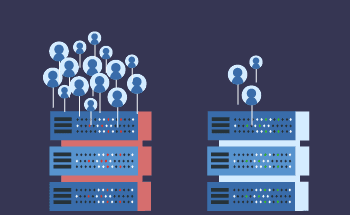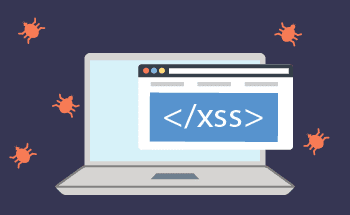How to choose the perfect hosting for a large website
14:20, 06.12.2022
Choosing a server is a complex question that cannot be answered in two words. Many aspects are important, from the type of server and its configuration to the virtualization technology and related services of the hosting provider. In this article, we'll tell you how to choose the perfect hosting for a large website. But first, let's understand why it matters in the first place.
Why choosing hosting is important
Hosting providers offer the opportunity to rent various types of servers to host websites, forums, accounting, etc. Most often, customers turn to such companies precisely to accommodate sites. In this case, the higher the quality of hosting services, the better for the site, because the performance, stability, and speed of the server affect the following aspects:
- Site availability. There is such a concept as uptime – this is the time of continuous operation of the computing system during the day. Hardware cannot work infinitely long, as it needs maintenance and rare restarts. The ideal uptime is 99.9%. At this value, the server will work on average 1438 out of 1440 minutes per day or 43140 minutes per month. The average downtime will not exceed 2 minutes per day – this will allow your website to always remain accessible. HostZealot provides this level of uptime, which is confirmed by monitoring of independent systems.
- Site security from DDoS attacks, viruses, SQL injections, and other types of threats. A good hoster always takes care of security by using some hardware solutions. In particular, it is recommended to use a secure network protocol SSH for data transfer, and all information should be encrypted using SSL.
- The effectiveness of SEO promotion. Yes, not only the internal and external optimization of the site but also the server itself, which hosts the site data, affects the position in search results. The bottom line is that the faster your site loads, the higher the probability that it will get to the top of the results for relevant keywords. Stability of operation, page loading speed, as well as response time – the indicators on which the server affects, so just renting an inexpensive hosting will not work if you intend to seriously develop this project.
Now let's move on to the main question: how to choose hosting for specific tasks.
What server will be optimal for your site
First and foremost – the level of attendance. If your site has mostly static content that is updated irregularly, then such a project does not require a powerful server - the average VPS with these characteristics suit:
For sites with predominantly static content, this will be more than enough, even if the attendance level is 25-30 thousand people per day. In this case, even limited traffic will not play a significant role – 2-4 TB per month will be enough.
But for sites with dynamic content, you may need a more powerful solution – a dedicated physical server or VDS. For reference, dynamic content is content that changes depending on demographic criteria, age, and gender of the site visitor.
Websites with dynamic content have become more and more relevant in recent years because they increase conversion rates and create a feeling in the eyes of the visitor that it is unique, that this site was created especially for them. Special algorithms will tailor content so that it is of interest to a specific individual. We are talking about pop-up banners, news selections, videos, and images. A vivid example of the implementation of this approach is the Amazon website, the main page of which will look different to two different users.
Of course, to ensure the high speed of the site with a lot of dynamic content you will need a more powerful server. More specifically about the recommended server specifications only a specialist can say after getting acquainted with your site and studying its content.
Hosting options, features, and benefits of different types of servers
There are three main types of servers, which differ both in technology and in the level of administrative authority. Let's take a closer look at each.
Virtual Private Server (VPS)
Imagine that a physical server is a large house divided into several apartments. Each apartment has its own kitchen, restroom, and one or even two rooms. This is a VPS – a private server with its own dedicated capacity, which in fact is just a part of a large physical server. The hosting provider simply gives you the "keys" to it, that is, access, and you can use all the available resources for your own purposes for a while.
VPS is the most affordable option, providing reduced opportunities in terms of administration and server configuration. For example, you will not have access to the operating system kernel. And, in addition, if virtualization is done with a software hypervisor, the "neighbors" will interfere with you.
When choosing a virtual private server, you should give preference to those hosting providers that offer virtualization at the hardware level – for example, using KVM technology. To return to the analogy, hardware virtualization can be compared to thick walls and secure doors to your apartment – no one will disturb you, and no one can intrude on your security. With software virtualization, on the other hand, you get a dorm apartment with the doors kicked in, where there is constant noise, and where any neighbor can invade your personal space if they want to.
VPS is suitable in most cases for sites and online stores with low or average attendance. Depending on the hosting provider, you can safely put any non-standard software on the server. In addition, VPS is good because of the convenience of scaling – if suddenly the current capacity for your project becomes too little, you can always contact the hosting provider and express a desire to move to a more advanced plan.
Dedicated Server
When renting this type of server, the client gets a full-fledged private home, not an apartment – that is, a whole physical server. They can dispose of the server as they like – install any software, change the configuration of the kernel, and even divide it into several virtual machines if necessary. Advantages of Dedicated Server:
- full access to the management of the software and physical equipment;
- absolute independence of resources;
- increased safety;
- higher stability and fault tolerance compared to VPS;
- advanced features for the webmaster.
At the same time, a dedicated server is a more expensive solution, and to take full advantage of all these benefits requires a qualified system administrator who can competently configure and prepare everything to work.
Thus, a dedicated server is the ideal web hosting option for a large site full of dynamic content. If your project has high traffic (more than 400,000 hits per month), this option is optimal. Also dedicated server is good for those projects that require increased security – these are any sites that provide banking, legal, or government services.
Virtual hosting (shared)
The cheapest and least attractive option in terms of performance, security, and fault tolerance. This is that "dormitory" in which it is noisy and there are many people who will somehow interfere with your quiet life. In this "dormitory" resources are, we can say, common – one toilet for all, 2-3 washing machines, and unreliable doors, which, if anything, anyone can break into.
With virtual hosting all clients are placed on one server, and the server resources they have in common, the division is very relative. Because of this, problems may arise when some "neighbor" constantly loads the hardware, all the others may simply not have enough resources for their tasks. And if the load is high at the same time from all accounts, then, in the end, the site will work correctly for no one, since the processor power will not be enough for all tasks.
Despite the many disadvantages of shared hosting, this option is relevant for placing small information resources with static content, as well as personal blogs and business sites. Any project that is not demanding to resources, and that does not need enhanced security, can safely be hosted on shared hosting – it will be much cheaper than a VPS or dedicated server.
Free hosting – is it worth using
There is another alternative – some hosting providers offer to place their projects on their servers without any payment. Resources there are very limited, and in return, the hoster gets the right to place their advertising on your site. This is the main source of income for such companies.
This option has the right to life if you are severely limited in the budget, but you should remember the disadvantages of such a solution:
- A large number of customers can cause your site to perform poorly, and this is bad for both SEO promotion and generally has a negative impact on the visitors' experience, their impressions;
- On your site various advertisements will be placed without your permission, often some kind of dubious casinos and betting companies;
- No one will give you any guarantees neither for uptime nor for data storage – in case of any malfunctions you can simply lose access to all your files, which were stored on someone else's server;
- low security – on free hosting your security is entirely your problem;
- high probability of theft of personal data of clients for the purpose of resale.
In general, in this case, the client has no rights, can not demand anything from the hoster, and in case of any problems no one will help you. Therefore, free web hosting is better not to use under any circumstances.
Summing up: what hosting to choose
So, to summarize all of the above:
- For small projects that do not imply a high workload, VPS is suitable. Excellent scalability and high uptime at low cost – this is important both for small and medium projects. If the project grows, you can always migrate to a dedicated or physical server.
- If you clearly know that your project requires deep optimization on the server side, and if you want full control over the allocated resources, you should give preference to dedicated servers. It's more expensive, but it pays off in the long run, both in terms of fault tolerance and performance.
- For projects that consume a lot of CPU and RAM, the best solution is a virtual server on a dedicated drive – so you are not "bogged down" in I/O storage. In this case, it is advisable to choose a service with unlimited traffic.
- As for projects that consume a large amount of traffic, it is recommended to place them on a dedicated server. This will provide optimal performance and storage capacity for its generation, while VPS and shared-hosting will definitely have problems with it.
Also, pay attention to the terms of cooperation with the hosting provider and its working methods. The ability to "jump" from one hosting plan to another in a matter of hours is a good advantage. The preference should be given to those hosts that offer a large number of locations in different parts of the world – as a rule, it indicates that the company has long been working and stable. Availability of technical support will also be a big plus because in this case, you will always help a qualified specialist with any questions related to the configuration, maintenance, and operation of the servers.


